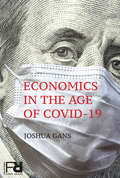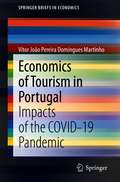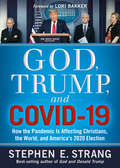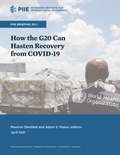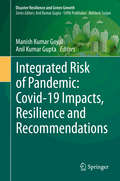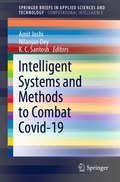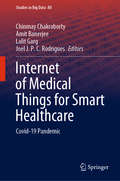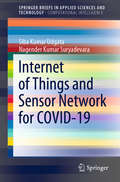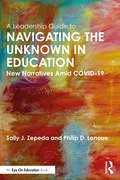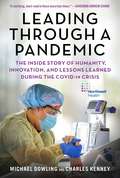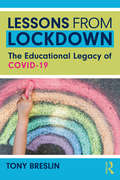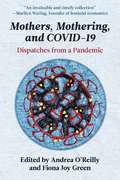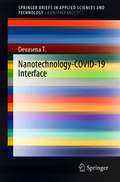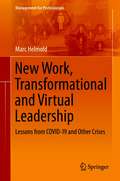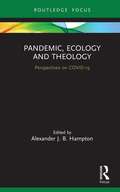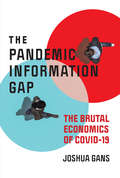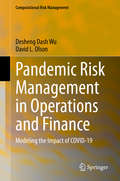Special Collections
Everything you ever wanted to know about the COVID-19 pandemic
- Table View
- List View
Economics in the Age of COVID-19
by Joshua GansA guide to the pandemic economy: essential reading about the long-term implications of our current crisis.The COVID-19 pandemic has unleashed a firehose of information (much of it wrong) and an avalanche of opinions (many of them ill-founded). Most of us are so distracted by the everyday awfulness that we don't see the broader issues in play. In this book, economist Joshua Gans steps back from the short-term chaos to take a clear and systematic look at how economic choices are being made in response to COVID-19. He shows that containing the virus and pausing the economy—without letting businesses fail and people lose their jobs—are the necessary first steps.
Economics of Tourism in Portugal
by Vítor João MartinhoThis Brief discusses impacts of the COVID-19 pandemic on the Portuguese tourism sector. Taking into account real-world conditions and the importance of the tourism sector for the Portuguese economy, this book highlights the economic contexts of tourism in Portugal at the regional and municipal levels, discussing pre-pandemic economic frameworks and projecting potential implications for the future. Using data provided by Statistics Portugal, the Brief performs econometric analysis on three cases: new paradigms for overnight stays and guests, changes in tourism revenues and prospective alternatives, and a comparison of effects on changes in number of guests and overnight stays at the regional level. Providing cutting edge analysis of a dynamic global situation, this Brief will be useful for researchers interested in tourism economics and European economics as well as policymakers and industry professionals.
Framework for Equitable Allocation of COVID-19 Vaccine
by Board on Population Health and Public Health Practice and Board on Health Sciences Policy and National Academies of Sciences, Engineering, and Medicine and Health and Medicine Division and Committee on Equitable Allocation of Vaccine for the Novel CoronavirusIn response to the coronavirus disease 2019 (COVID-19) pandemic and the societal disruption it has brought, national governments and the international community have invested billions of dollars and immense amounts of human resources to develop a safe and effective vaccine in an unprecedented time frame. Vaccination against this novel coronavirus, severe acute respiratory syndrome coronavirus 2 (SARS-CoV-2), offers the possibility of significantly reducing severe morbidity and mortality and transmission when deployed alongside other public health strategies and improved therapies. Health equity is intertwined with the impact of COVID-19 and there are certain populations that are at increased risk of severe illness or death from COVID-19. In the United States and worldwide, the pandemic is having a disproportionate impact on people who are already disadvantaged by virtue of their race and ethnicity, age, health status, residence, occupation, socioeconomic condition, or other contributing factors. Framework for Equitable Allocation of COVID-19 Vaccine offers an overarching framework for vaccine allocation to assist policy makers in the domestic and global health communities. Built on widely accepted foundational principles and recognizing the distinctive characteristics of COVID-19, this report's recommendations address the commitments needed to implement equitable allocation policies for COVID-19 vaccine.
Gavi and COVID-19: Pandemic of the Century
by Sid Misra and Ashish KhannaGavi has helped immunize over 760 million children in the world's poorest countries over the past 20 years saving 13 million lives. How should Gavi respond to the need for a vaccine for the worldwide COVID-19 pandemic?
God, Trump, and COVID-19
by Stephen E. StrangFrom the best-selling author of God and Donald Trump, which was brandished by the president at the World Economic Forum in DavosHow the Pandemic Is Affecting Christians, the World, and America's 2020 Election This book is a timely follow up to God, Trump and the 2020 Election that reveals insider information about China, the virus, and the ever-increasing stakes of the upcoming election. It will answer the question for the Christian believers (and seekers) of where God is in all this? It provides a little known prophecy by the late David Wilkerson about a plague coming that would shut down the government as well as churches and bars, including shaking New York City as it&’s never been shaken. Wilkerson said this plague would force believers into radical prayer that will spark an awakening--something echoed by Christian leaders and prophets. Just as the economy was booming and Donald Trump was fixing long-term problems and beating back attacks from his opponents, a brand-new virus shakes up everything including the outcome of this election. The author has inside information about what happened in China early in the pandemic and what went wrong. He even documents how Donald Trump has led the nation in this time of crisis. In 2016, God raised up Donald Trump to lead America at a pivotal time. Evangelicals who recognized this backed him more than any other presidential candidate in history. Heading into Election Day 2020, the stakes are even higher, especially with the uncertainty and upheaval caused by COVID-19. This book is really &“part two&” of God, Trump and the 2020 Election which details the fight for the soul of America. Strang believes readers need both books to understand and explain what&’s at stake. With the shutdown caused by the pandemic, serious anti-Christian trends surfaced, such as some states closing &“non-essential&” churches but allowing liquor stores to provide curbside service. Or ceasing all elective surgeries except abortion, which is the taking of a life while the purpose in shutting down the economy was to save lives from this dreaded virus.Other Books Available:God, Trump, and the 2020 Election ISBN: 9781629996653 (2020)Trump Aftershock ISBN: 9781629995557 (2018)God and Donald Trump ISBN: 9781629994864 (2017)
How the G20 Can Hasten Recovery from COVID-19
by Maurice Obstfeld and Adam S. PosenThe world's leading economic powers must cooperate more to combat the health and economic shocks resulting from the COVID-19 pandemic. In a new free eBook, PIIE Briefing, How the G20 can hasten recovery from COVID-19, Peterson Institute experts outline how collective action by the Group of Twenty (G20) nations can make a difference. The PIIE agenda includes removal of trade barriers impeding the flow of medical supplies and food, and more money for research, testing, and disease control, especially for debt-burdened low-income countries. The World Bank and the World Health Organization need more resources to relieve suffering, and the International Monetary Fund must step up to stabilize the world financial system.
Integrated Risk of Pandemic: Covid-19 Impacts, Resilience and Recommendations
by Anil Kumar Gupta and Manish Kumar GoyalIn light of the novel corona virus outbreak in December 2019 and its subsequent impact on entire world as a global pandemic, the book attempts to provide integrated risk assessment on Covid -19 like pandemics, as well as to understand the societal, environment and economic impact of the outbreak in various sectors of development. It covers fundamental factors of global disease outbreaks and its coverage as major disaster through the complexity and severity of consequences, illustrating the dimensions of low frequency high intensity disasters. It brings together broad range of topics including basic concepts, isolation measure, role of governance and key technical advancements for containing the diseases. In addition, it also covers resilience analysis towards the impacts such outbreaks have on bio-diversity, ecosystem services and agricultural food production. It defines key exit strategies from the lessons learned and success stories of historical disease outbreaks. The book is presented in four parts, where part 1 familiarizes with fundamentals; part 2 focuses on integrated risk assessments; part 3 focuses on various measures and strategies of resilience; and part 4 suggests key lessons and recommendations. The book is a useful reading reference for scientific community, policy makers and professionals across the domains of health, environment, disasters and sustainable development. Book is specifically beneficial for postgraduate students, researchers, planners and field professionals.
Intelligent Systems and Methods to Combat Covid-19
by Nilanjan Dey and Amit Joshi and K. C. SantoshThis book discusses intelligent systems and methods to prevent further spread of COVID-19, including artificial intelligence, machine learning, computer vision, signal processing, pattern recognition, and robotics. It not only explores detection/screening of COVID-19 positive cases using one type of data, such as radiological imaging data, but also examines how data analytics-based tools can help predict/project future pandemics. In addition, it highlights various challenges and opportunities, like social distancing, and addresses issues such as data collection, privacy, and security, which affect the robustness of AI-driven tools. Also investigating data-analytics-based tools for projections using time series data, pattern analysis tools for unusual pattern discovery (anomaly detection) in image data, as well as AI-enabled robotics and its possible uses, the book will appeal to a broad readership, including academics, researchers and industry professionals.
Internet of Medical Things for Smart Healthcare
by Amit Banerjee and Joel J. P. C. Rodrigues and Chinmay Chakraborty and Lalit GargThis book covers COVID-19 related research works and focuses on recent advances in the Internet of Things (IoT) in smart healthcare technologies. It includes reviews and original works on COVID-19 in terms of e-healthcare, medicine technology, life support systems, fast detection, diagnoses, developed technologies and innovative solutions, bioinformatics, datasets, apps for diagnosis, solutions for monitoring and control of the spread of COVID-19, among other topics. The book covers comprehensive studies from bioelectronics and biomedical engineering, artificial intelligence, and big data with a prime focus on COVID-19 pandemic.
Internet of Things and Sensor Network for COVID-19
by Nagender Kumar Suryadevara and Siba Kumar UdgataThis book examines various models/solutions in areas, such as individuals, home, work and society, where IoT and AI are being utilized to mitigate the Covid-19 pandemic. The world is battling with the novel coronavirus, and government authorities, scientists, medical practitioners, and medical services are striving hard to help people to face the challenges. During this crisis, numerous innovative ideas and solutions have been proposed for using the Internet of things (IoT), sensor networks, and artificial intelligence (AI) to monitor the wellbeing of individuals. Nations are using all available assets to help develop cutting-edge innovations to relieve the impacts of Covid-19 and profile individuals in danger. The advances in IoT frameworks and sensor technologies together with AI are invaluable in the context of this pandemic, and nations and various entities around the globe are discovering innovative solutions to maintain businesses and help people live alongside Covid-19. This book presents the advances in sensor technologies, IoT frameworks, and explores how these technologies are being used to deal with the issues arising from Covid-19, including work in progress and potential applications.
Jan Swartz: Steering Princess Cruises Through the COVID-19 Crisis
by Boris Groysberg and Michael NorrisIn the summer of 2020, Jan Swartz, President of Princess Cruises, was persevering to lead her company back from the depths of the COVID-19 Pandemic. Diamond Princess, one of Princess Cruises' 18 ships was the site of one of the earliest large outbreaks of COVID-19 outside of China. The outbreak led to hundreds of cases, at least a dozen deaths, media scrutiny, government investigations, and legal proceedings. In early March 2020, Swartz made the decision to pause all global operations of her company, the first cruise company to do so. Six months later, how could Princess Cruises restart operations safely and profitably?
Jharkhand Covid 19
by National Disaster Management AuthorityThis booklet about Guidelines for protection and safety of persons with disabilities (Divyangjan) during COVID 19.
Latam Airlines and COVID-19: Seeking Bankruptcy Protection in the United States
by Laura Alfaro and Sarah Jeong and Carlos Vilches and Mauricio LarrainOn May 26, 2020, Latam Airlines became the largest airline in the world to be driven to bankruptcy by COVID-19. With a complex debt structure and international investor composition, the company decided to file for bankruptcy protection in the United States, which offered a more flexible reorganization procedure than the local bankruptcy process. After the filing announcement, the company reached an all-time-low stock market valuation. Some experts questioned whether the bankruptcy filing of Latam Airlines in the United States could be detrimental for the development of the Chilean capital market. Even if the company succeeded financially, would it be able to adapt to a different way of flying post-COVID?
A Leadership Guide to Navigating the Unknown in Education
by Sally J. Zepeda and Philip D. LanoueRecognizing that education systems have been temporarily paralyzed in the past and likely will in the future—whether it’s because of a natural disaster or a pandemic—this important volume offers critical insights about how schools can effectively carry forward the mission of educating all children even in the face of system turbulence and disruption. Featuring Narratives from expert leaders in urban, rural, and suburban school systems, this book explores important questions about the "new normal" such as the ways in which students can and should learn, how educators can teach and lead effectively, and how schools can carry out important functions beyond their instructional mission. Chapters present inspiring stories of leaders and teachers who have rallied, rebuilt, and problem-solved in face of the pandemic and amid adversity, ultimately providing a roadmap for how it’s possible to rebuild and adjust while preserving the fundamental core of education. Full of takeaways and first-hand insights into how systems and their schools faced turbulence, disruption, and adaptation, this book is a must-read for today’s educators committed to making a positive impact on the students they have the duty to serve.
Leading Through a Pandemic
by Charles Kenney and Michael J. Dowling"A clarifying must-read in these uncertain times.&” —GOVERNOR ANDREW CUOMO Journey behind the front lines of the coronavirus pandemic with Northwell Health, New York&’s largest health system. What was it like at the epicenter, inside the health system that cared for more COVID-19 patients than any other in the United States? Leading Through a Pandemic: The Inside Story of Lessons Learned about Innovation, Leadership, and Humanity During the COVID-19Crisis takes readers inside Northwell Health, New York&’s largest health system. From the C-suite to the front lines, the book reports on groundwork that positioned Northwell as uniquely prepared for the pandemic. Two decades ago, Northwell leaders began preparing for disasters—floods, hurricanes, blackouts, viruses, and more based on the belief that "bad things will happen and we have to be ready." Following a course highly unusual for an American health system, Northwell developed one of the most advanced non-government emergency response systems in the country. Northwell reached a point where leaders could confidently say "we are comfortable being uncomfortable in a crisis." But even with sustained preparation, the pandemic stands as a singularly humbling experience. Leading Through a Pandemic offers guidance on how hospitals and health systems throughout the country can prepare more effectively for the next viral threat. The book includes dramatic stories from the front lines at the peak of the viral assault and lessons of what went well, and what did not. The authors draw upon the Northwell experience to prescribe changes in the health care system for next time. Beyond the obvious need for increased stockpiles of supplies and equipment is the far more challenging task of fundamentally changing the culture of American health care to embrace a more robust emergency response capability in hospitals and systems of all sizes across the nation. The book is a must read for health care professionals, policy-makers, journalists, and readers whose curiosity demands a deeper dive into the surreal realm of the coronavirus pandemic.
Lessons from Lockdown
by Tony BreslinLessons from Lockdown explores the impact of COVID-19 on our schooling systems, on the young people and families that they serve and on all who work in – and with – our schools, and asks what the long-term ramifications of the pandemic might be for the pedagogy and purpose of formal education. Drawing on the voices of more than a hundred pupils, parents and professionals, it reveals how teachers and learners are adapting practice in areas such as curriculum modelling, parental engagement, assessment and evaluation and blended and online learning. In this timely new book, Tony Breslin draws on his experience as a teacher, researcher, examiner, school governor and policy influencer to assess what the educational legacy of COVID-19 could be, and the potential that it offers for reframing how we ‘do’ schooling. Whatever your place in this landscape, Lessons from Lockdown is a must-read for all concerned about the shape and purpose of schooling systems in mature economies – schooling systems and economies set on recovering from the kind of ‘system shock’ that the pandemic has delivered.
Merck: Covid-19 Vaccines
by Willy ShihCovid-19 infections were still climbing across the U.S. and many other parts of the world in September 2020, and it seemed that every time Ken Frazier, the CEO of Merck & Co. consented to an interview in recent months he always seemed to hear the same question, "Where's Merck?" The company, a leader in the global vaccine business had a low public profile even though it was working assiduously on two vaccine candidates for the SARS-CoV-2 virus that causes Covid-19. The U.S. Government had initiated a high profile program - Operation Warp Speed (OWS) - to accelerate the development of vaccines, but Merck was notably absent. Should Merck seek or accept funding from OWS, and what terms might accompany such an agreement?
Migros Turkey: Scaling Online Operations During COVID-19 (C)
by Gamze Yucaoglu and Antonio MorenoThe case opens in August 2020 as Ozgur Tort and Mustafa Bartin, CEO and chief large-format and online retail officer of Migros Ticaret A.S. (Migros), Turkey's oldest and one of its largest supermarket chains, are navigating Migros through COVID-19 and the unprecedented surge in demand in online groceries. Between the first official case in Turkey in March and August, customers have flocked to online shopping and Migros' teams have been busy trying to solve the picking, fulfillment, and logistics bottlenecks. In the six months, the company recruited and trained new pickers, expanded its delivery fleet, and converted less busy stores into dark stores. Quick to react, Migros was able to add new customers to its base and was proud of its accomplishments. Now, unable to forecast how much of the surge in demand for online was here to stay, how should Migros plan for the future of Sanal Market and Hemen? Was there anything the company could do to sustain the number of hybrid shoppers it acquired during the past few months?
Mortgage Backed Securities and the Covid-19 Pandemic
by Luis M. Viceira and Emil Nuwan Siriwardane and Dean XuIn April 2020, global financial markets were still reeling as the Covid-19 pandemic spread rapidly across the world. Global equity markets had initially fallen by 30% in response to the pandemic, and high-yield credit markets had dropped by nearly 20%. In contrast, U.S. Treasury markets were up 20% year-to-date (YTD). Interestingly, the U.S. Mortgage Backed Security (MBS) market had been much less responsive to the health crisis, exhibiting very low volatility throughout this period and returning about 2% YTD. Maya Russell, head of asset allocation research at a large global institutional investor, must make a recommendation on whether her fund's board should invest in MBS, and if so, whether this is a good time for the fund to implement the allocation and whether it should do so pursuing an active or a passive investment approach. This case covers a wide range of topics in fixed-income investing, including duration and interest rate risk, prepayment risk, mortgage securitization, and the design of mortgage-backed securities. These concepts are analyzed from the perspectives of both individual and professional investors in fixed-income and mortgage markets.
Mothers, Mothering, and COVID-19
by Andrea O’Reilly;Fiona Joy GreenThere has been little public discussion on the devastating impact of Covid-19 on mothers, or a public acknowledgement that mothering is frontline work in this pandemic. This collection of 45 chapters and with 70 contributors is the first to explore the impact of the pandemic on mothers' care and wage labour in the context of employment, schooling, communities, families, and the relationships of parents and children. With a global perspective and from the standpoint of single, partnered, queer, racialized, Indigenous, economically disadvantaged, disabled, and birthing mothers, the volume examines the increasing complexity and demands of childcare, domestic labour, elder care, and home schooling under the pandemic protocols; the intricacies and difficulties of performing wage labour at home; the impact of the pandemic on mothers' employment; and the strategies mothers have used to manage the competing demands of care and wage labour under COVID-19. By way of creative art, poetry, photography, and creative writing along with scholarly research, the collection seeks to make visible what has been invisibilized and render audible what has been silenced: the care and crisis of motherwork through and after the COVID-19 pandemic.
Nanotechnology-COVID-19 Interface
by Devasena T.This book highlights the role of nanotechnology concepts in the management of COVID-19 pandemic. The book covers different aspects of the causative agent SARS CoV2 (Severe Acute Respiratory Syndrome Coronavirus-2) and the COVID-19 pandemic with a special emphasis on nanotechnology. It discusses the origin and history of SARS CoV2 and the outbreak of COVID-19 and highlights the geographical mutations in the SARS CoV2 virus genome, providing information about the structural features, antigenicity and the life cycle of SARS CoV2. The book provides an insight into nanotechnology–virology interface and explains how nanomaterials link the gap between the vital phases of SARS CoV2 life cycle and the four modalities of COVID-19 management viz sensing/diagnosis, therapy, prevention and self-protection. Further, the existing and promising diagnostic tools for detection of COVID-19 are discussed with an emphasis on nano PCR, nanoimmunosensors, biobarcode assay and point of care approach and also describe the nanoparticles involved in the CT imaging of lungs and SFHI (Spatial Frequency Hetrodyne Imaging) for diagnosis of SARS COV2 infection. The book concludes with details about translational medicine and explains the types of SARS CoV2 vaccines, stages of COVID-19 vaccine development and possible nanovaccines for COVID-19, followed by the description on biopharmaceutical companies involved in the production of SARS CoV2 vaccines.
New Work, Transformational and Virtual Leadership
by Marc HelmoldThe increasing globalization, the battle for talents, and global trends are changing the work patterns in organisations around the globe. Enterprises are working across country and cultural borders alongside complex supply and demand networks. Global incidents such as the financial crisis in 2008 and the recent COVID-19 pandemic have forced global organizations to find innovative ways to continue to connect globally and maintain a competitive advantage. Therefore, innovative enterprises have established global and virtual organisations including members of the value chain on supply and demand side. This book outlines these new work and leadership styles, and agile organisations, which are necessary to work virtually and globally. It provides case studies and experiences from different global organizations in different industries and sectors with a focus on value-adding processes and services.
Pandemic, Ecology and Theology
by Alexander J. B. HamptonAs the sequential stages of the 2020 COVID-19 pandemic have unfolded, so have its complexities. What initially presented as a health emergency, has revealed itself to be a phenomenon of many facets. It has demonstrated human creativity, the oft neglected presence of nature, and the resilience of communities. Equally, it has exposed deep social inequities, conceptual inadequacies, and structural deficiencies about the way we organize our civilization and our knowledge. As the situation continues to advance, the question is whether the crisis will be grasped as an opportunity to address the deep structural, ecological and social challenges that we brought with us into the second decade of the new millennium. This volume addresses the collective sense that the pandemic is more than a problem to manage our way out of. Rather, it is a moment to consider our broken relationship with the natural world, and our alienation from a deeper sense of purpose and meaning. The contributors, though differing in their diagnoses and recommendations, share the belief that this moment, with its transformative possibility, not be forfeit. Equally, they share the conviction that the chief ground of any such reorientation ineluctably involves our collective engagement with both ecology and theology.
The Pandemic Information Gap
by Joshua GansWhy solving the information problem should be at the core of our pandemic response: essential reading about the long-term implications of our current crisis.COVID-19 is caused by a virus. The COVID-19 pandemic is caused by a lack of good information. A pandemic is essentially an information problem: this is the enlightening and provocative idea at the heart of this book. If we solve the information problem, argues economist Joshua Gans, we can defeat the virus. For example, when we don't know who is infected, we have to act as if everyone is infected. If we actively manage the information problem--if we know who is infected and with whom they had contact--we can suppress the virus or buy time for vaccine development.This is an expanded version of an eBook originally published as Economics in the Age of COVID-19.
Pandemic Risk Management in Operations and Finance
by David L. Olson and Desheng Dash WuCOVID-19 has spread around the world, causing tremendous structural change, and severely affecting global supply chains and financial operations. As such there is a need for analytic tools help deal with the impact of the pandemic on the world’s economies; these tools are not panaceas and certainly won’t cure the problems faced, but they offer a means to aid governments, firms, and individuals in coping with specific problems. This book provides an overview of the COVID-19 pandemic and evaluates its effect on financial and supply chain operations. It then discusses epidemic modeling, presenting sources of quantitative and text data, and describing how models are used to illustrate the pandemic impact on supply chains, macroeconomic performance on financial operations. It highlights the specific experiences of the banking system, which offers predictions of the impact on the Swedish banking sector. Further, it examines models related to pandemic planning, such as evaluation of financial contagion, debt risk analysis, and health system efficiency performance, and addresses specific models of pandemic parameters. The book demonstrates various tools using available data on the ongoing COVID-19 pandemic. While it includes some citations, it focuses on describing the methods and explaining how they work, rather than on theory. The data sets and software presented were all selected on the basis of their widespread availability to any reader with computer links.
